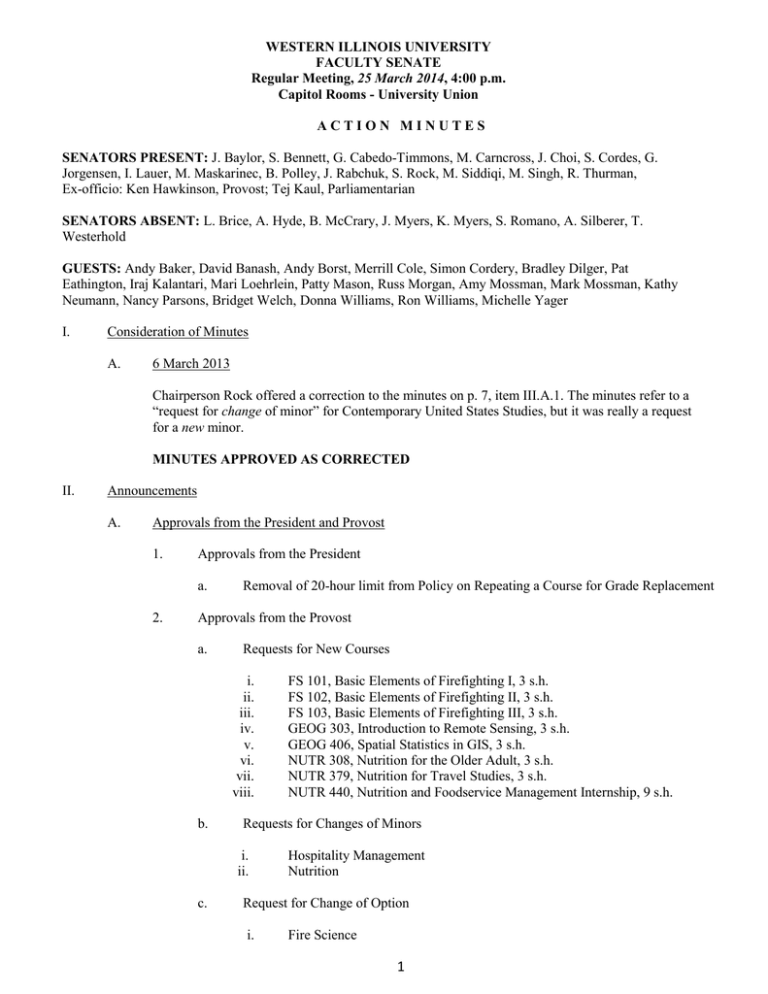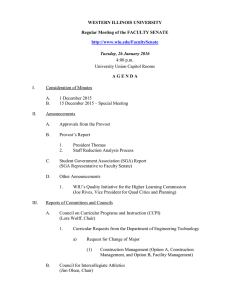WESTERN ILLINOIS UNIVERSITY FACULTY SENATE 25 March 2014
advertisement

WESTERN ILLINOIS UNIVERSITY FACULTY SENATE Regular Meeting, 25 March 2014, 4:00 p.m. Capitol Rooms - University Union ACTION MINUTES SENATORS PRESENT: J. Baylor, S. Bennett, G. Cabedo-Timmons, M. Carncross, J. Choi, S. Cordes, G. Jorgensen, I. Lauer, M. Maskarinec, B. Polley, J. Rabchuk, S. Rock, M. Siddiqi, M. Singh, R. Thurman, Ex-officio: Ken Hawkinson, Provost; Tej Kaul, Parliamentarian SENATORS ABSENT: L. Brice, A. Hyde, B. McCrary, J. Myers, K. Myers, S. Romano, A. Silberer, T. Westerhold GUESTS: Andy Baker, David Banash, Andy Borst, Merrill Cole, Simon Cordery, Bradley Dilger, Pat Eathington, Iraj Kalantari, Mari Loehrlein, Patty Mason, Russ Morgan, Amy Mossman, Mark Mossman, Kathy Neumann, Nancy Parsons, Bridget Welch, Donna Williams, Ron Williams, Michelle Yager I. Consideration of Minutes A. 6 March 2013 Chairperson Rock offered a correction to the minutes on p. 7, item III.A.1. The minutes refer to a “request for change of minor” for Contemporary United States Studies, but it was really a request for a new minor. MINUTES APPROVED AS CORRECTED II. Announcements A. Approvals from the President and Provost 1. Approvals from the President a. 2. Removal of 20-hour limit from Policy on Repeating a Course for Grade Replacement Approvals from the Provost a. Requests for New Courses i. ii. iii. iv. v. vi. vii. viii. b. Requests for Changes of Minors i. ii. c. FS 101, Basic Elements of Firefighting I, 3 s.h. FS 102, Basic Elements of Firefighting II, 3 s.h. FS 103, Basic Elements of Firefighting III, 3 s.h. GEOG 303, Introduction to Remote Sensing, 3 s.h. GEOG 406, Spatial Statistics in GIS, 3 s.h. NUTR 308, Nutrition for the Older Adult, 3 s.h. NUTR 379, Nutrition for Travel Studies, 3 s.h. NUTR 440, Nutrition and Foodservice Management Internship, 9 s.h. Hospitality Management Nutrition Request for Change of Option i. Fire Science 1 d. Request for Change of Major i. Supply Chain Management e. Requests for New Certificates of Undergraduate Studies i. Integrated Marketing Communications ii. Marketing Technologies B. Provost’s Report Provost Hawkinson informed senators that the budget reports for units under Academic Affairs were heard today. The Provost and his team received reports from the four academic colleges, University Libraries, and the nine directors of various areas under the Provost’s office. Provost Hawkinson stated there are many exciting things going on and a lot of innovation; despite the budget situation, individuals are not reluctant to propose new programs, come up with new ideas, and engage in outreach to the community. He will be combining the reports into one recommendation for Academic Affairs which he will present to the President next month. Provost Hawkinson recognized that Faculty Senate has been involved in encouraging faculty to utilize the early warning grading system, which he believes is one very important way that faculty can help the retention rate. As of the ninth week, the spring early warning return rate showed 65.7 percent participation, a 3.2 percent increase from last spring. The Provost reported that the College of Business and Technology showed the most significant increase with a 79.3 percent submitting this spring compared to 70.7 percent last spring. The College of Arts and Sciences rate rose from 74.5 percent last year to 75.8 percent this year. The College of Education and Human Services early warning rate was 53.7 percent last year and increased to 54.2 percent this year, while the College of Fine Arts and Communication’s early warning rate rose from 46.5 percent last year to this year’s 52.4 percent. The early warning participation rate for courses taken by freshmen this spring was 70.4 percent; 100- and 200-level courses showed a 71 percent return; FYE courses indicated an 81.8 percent early warning return rate; the online course return rate was 76.7 percent; and the participation rate for UNIV 100 courses was 90 percent this spring. Provost Hawkinson wishes the rates were much higher but is very pleased with the increases. He thanked Faculty Senate for supporting this effort. Chairperson Rock asked what Provost Hawkinson thinks the maximum effective rate of response goal should be for early warning grades. The Provost responded that he would like to see 100 percent participation; he believes every professor should let his or her students know what their grades are by the ninth week of classes. He noted that these rates are the highest WIU has seen in recent years and suggested that he could ask the Registrar what kinds of response rates are seen by Western’s benchmark universities. Chairperson Rock asked if there is a sense why some faculty do not submit early warning grades. Senator Polley, who chaired the Faculty Senate’s 2012 ad hoc Committee to Review the Early Warning Grading System, responded that there are some courses, such as music ensemble class, where students probably know their status without the necessity of early warning grades; other courses may not have useful information to provide by the ninth week. He thinks that an 80 percent return rate would be very high, and a 75 percent rate University-wide would be a more reasonable goal. Provost Hawkinson reported that the early warning response rate for Athletics this spring was 80 percent. Michelle Yager, Director of University Advising and Academic Support Services, reported that the rate for OAS students was 49 percent in fall 2013 and 51 percent this spring. Provost Hawkinson noted that OAS students are at-risk and the rate includes largely freshman courses, so that response rate needs to increase. He remarked that Athletics has a very sophisticated system in place for early warning grades. Ms. Yager explained that Athletics utilizes Grades First, which was too expensive for purchase by her office. Administrative 2 Information Management Services, however, devised a similar system for OAS at no cost to the University, and she encourages faculty to utilize it. Provost Hawkinson meets with the Chairs’ Council tomorrow and will ask them to remind faculty about reporting their early warning grades. Parliamentarian Kaul suggested that Provost Hawkinson remove independent study courses from inclusion in the early warning system because the time frame for reporting those types of courses is very different from that of standard courses. Dr. Walia observed that her students always know where they stand in her classes because she utilizes Western Online. She asked if there is any reason to submit mid-term reports other than to let students know when they are at risk. Ms. Yager responded that there is a place on the system utilized by OAS to include comments, which advisors can use when talking to students about their performance and developing plans for success, such as putting students in touch with tutors. She added that OAS students have waived their parental rights, so their academic progress can be shared with parents who can partner with advisors in encouraging OAS students. Senator Lauer pointed out that during CAGAS appeals it is sometimes important to show whether students were notified of their academic standing; CAGAS does have access to early warning grades, and this can be a decisive factor in their deliberations. Senator Maskarinec observed that Western Online shows a percentage grade, while early warning grades provide an additional piece of information for students who may need to see an actual D or F grade as a stark reminder that they need to take some action toward improvement. He stated that there is no way for a student to see his or her letter grade thus far on Western Online, so he believes that the early warning grading system is still useful. C. Student Government Association (SGA) Report – None D. Other Announcements 1. Recruiting Faculty for IAI Panels (Ron Williams, Assistant Vice President for Academic Affairs) Chairperson Rock announced that Dr. Williams is seeking faculty to serve on Illinois Articulation Initiative (IAI) panels, which involves assessing when a course taken at one institution can be considered equivalent to a similar course taken at another institution. Dr. Williams explained that IAI represents a statewide transfer agreement in which WIU participates as a transfer institution. This involves an agreement to accept lower-level General Education or upper-level major courses in a very formal format and which faculty have had a chance to review in order to verify that the courses meet Western’s standards for transfer. Dr. Williams explained that this process assists students transferring from community colleges to universities or from university to university. He related there has been a greater need for faculty to participate in these panels statewide in recent years, possibly because universities’ budgetary challenges may have made it difficult for faculty to attend meetings. Dr. Williams explained that there are two types of IAI panels: General Education panels, which involve the Gen Ed core curricula, and major panels. The panels provide a forum for faculty in participating institutions to guide transfer curricula for General Education and majors. He explained that participation on the panels can provide a common understanding about IAI courses and help the University monitor changes in disciplinespecific or General Education areas. He added that faculty may participate in developing the general content guidelines and learning objectives; articulating the rationale for content guidelines for courses; helping to make sure that IAI courses meet all of the guidelines in the General Education core or the discipline area; and engaging in a final review of the courses to make sure that they meet all IAI guidelines. Dr. Williams stated that if a faculty member of an IAI panel sees that a community college course would not meet the standards set for WIU, the faculty member can offer advice and suggestions as 3 to how that course can be changed by the community college to improve its transfer standards. Dr. Williams stated that each panel includes representatives from public institutions, private institutions, and community colleges. When a vacancy occurs, Dr. Williams notifies the chair of the corresponding department at WIU. He related that Chairperson Rock suggested he speak to Faculty Senate about possible better ways of identifying faculty who may want to participate in IAI panels. He believes such participation represents a great way for faculty to serve while contributing to the overall functioning of the University. Chairperson Rock pointed out that at this time of year the Faculty Senate Nominating Committee distributes surveys asking faculty about their interest in engaging in service. He noted that there are more faculty interested in service opportunities than there are vacancies for them to fill on committees and councils. He thinks IAI panels represent another opportunity for faculty to gain service but noted that there should not be more than a couple of representatives from any one university on a given panel. Chairperson Rock suggested that the Senate Nominating Committee could play a role in helping to fill vacancies on IAI panels; a way could be determined to select nominees if a number are interested in any one panel. Chairperson Rock noted that Senators Rabchuk, Bennett, Westerhold, and Siddiqi currently serve on IAI panels. Senator Rabchuk related that he volunteers on a physics major panel, but the decision to give an IAI designation to a particular course is determined by whether the course meets the IAI descriptor, which is set by IAI throughout the state; as a panel member, Senator Rabchuk would not be able to say that even though a course was determined to have met the IAI descriptor, it would not be accepted at WIU. He added that the state of Illinois has strongly encouraged departments with physics majors, and will eventually encourage all majors in the state, to accept the courses that are previously accepted by the IAI panels. Dr. Williams agreed that IAI is strongly encouraging this, but he does not think IAI can force universities to accept the courses approved by IAI panels; Senator Rabchuk reiterated that it seemed to him as though WIU would have to agree to accept all courses approved by IAI. Dr. Williams stated that flagship institutions in the state have rejected IAI courses; there is a penalty for this rejection, but it is “in good faith.” Dr. Williams stated that IAI is intended primarily to help with timely completion and to allow students to begin their careers at community colleges. He believes accepting IAI courses helps WIU and other four-year institutions to recruit community college students, and accepting incoming transfer courses has not been an issue at WIU in the past as long as they have an IAI code. Senator Rabchuk stated that it benefits WIU faculty to be involved on IAI panels in order to understand the descriptors and whether courses meet established guidelines. Dr. Williams pointed out that it would negatively affect a student taking a course with an IAI code if that course was not approved by the transferring department; he noted that the student might be placed in a higher-level course in which he or should might struggle or not be successful in passing. Chairperson Rock suggested that a message be sent to faculty utilizing the Faculty Senate listproc and linking to the IAI webpage to solicit interest in serving on IAI panels. He suggested that the Senate Nominating Committee could work with the Provost’s office to determine selection criteria. He added that panels typically meet twice a year in a central location, and there is usually a telephone participation option. 2. Two faculty members from the College of Fine Arts and Communication submitted petitions by the deadline for the three vacant seats from that college for fall 2014 on Faculty Senate. Jeff Brown, Music, was elected for a three-year term, and Amy Burke, Communication Sciences and Disorders, will serve a two-year term on Senate. Petitions are sought to fill the remaining one-year seat for Fine Arts and Communication. Petitions are also being sought for a one-year position on Faculty Senate from the College of 4 Business and Technology. The deadline for petitions from both colleges is Wednesday, March 26. 3. III. Distinguished Faculty Lecturer David Rohall, Sociology and Anthropology, will present “Peach Blossoms in a Post-Military World: Working with Iraq-Era Student Veterans” at 7:00 p.m. on Wednesday, March 26, in the COFAC Recital Hall, and at 3:00 p.m. on Tuesday, April 1 in Room 102 of the WIU Quad Cities 60th Street Campus. Reports of Committees and Councils A. Council on Curricular Programs and Instruction (CCPI) (Bridget Welch, Chair) 1. Curricular Requests from the School of Agriculture a) Request for New Course (1) HORT 382, Landscape Plants III, 3 s.h. NEW COURSE APPROVED 2. Curricular Requests from the Department of English and Journalism a) Requests for New Courses (1) (2) ENG 359, LGBT Topics in Literature, 3 s.h. ENG 388, Writing for the Web, 3 s.h. Senator Rabchuk asked if ENG 388 is the first course of a sequence; English and Journalism Chair Mark Mossman confirmed this is correct. (3) ENG 489, Grant and Proposal Writing, 3 s.h. NEW COURSES APPROVED b) Request for Change of Minor (1) Professional Writing Chairperson Rock noted that a revised request was emailed to senators. JOUR 340 was added back into the directed electives at the request of the department. CHANGE OF MINOR APPROVED AS AMENDED c) Request for Change of Major (1) English (Option A: Language and Literature) CHANGE OF MAJOR APPROVED 3. Curricular Requests from the College of Arts and Sciences a) Request for Change of Major (1) Bachelor of Liberal Arts and Sciences 5 Senator Rabchuk observed that Emphasis A, Part 3, indicates that students should select one of the following methods courses, but does not include any choices from Chemistry or Physics. Director of the Liberal Arts and Sciences Program Amy Mossman explained that it was impossible to include Chemistry or Physics courses because of the number of prerequisites. CHANGE OF MAJOR APPROVED 4. Curricular Requests from the School of Nursing a) Requests for New Courses (1) (2) (3) (4) NURS 434, Geropsychiatric Nursing I, 3 s.h. NURS 436, Geropsychiatric Nursing II, 3 s.h. NURS 438, Forensic Nursing, 3 s.h. NURS 440, Electrocardiographic Monitoring and Dysrhythmia Management, 3 s.h. Senator Rabchuk asked if the School of Nursing has sufficient faculty to staff the four new courses. Nursing professor Pat Eathington responded that the courses are elective and will be taught mostly online. Nursing rotates the teaching of their elective courses throughout their faculty. NEW COURSES APPROVED 5. Curricular Requests from the Department of Mathematics a) Request for New Course (1) MATH 496, Internship, 3-12 s.h., repeatable once to a combined maximum of 12 s.h. NEW COURSE APPROVED b) Request for New Option (1) Mathematics (Option C: Computational and Data-Enabled Applied Mathematics and Statistics) NEW OPTION APPROVED B. Council for International Education (Bhavneet Walia, Chair) 1. Requests for Discipline-Specific Global Issues Designation a) HIST 380, The Great War, 1914-1918, 3 s.h. Senator Rabchuk asked if CIE asks for courses to address all of the items listed on p. 1 of the DSGI request form. Dr. Walia responded that courses must address all three of the goals but may choose any two of the objectives. DSGI COURSE APPROVED IV. Old Business – None V. New Business – None 6 Motion: To adjourn (Siddiqi) The Faculty Senate adjourned at 4:30 p.m. Jim Rabchuk, Senate Secretary Annette Hamm, Faculty Senate Recording Secretary 7

